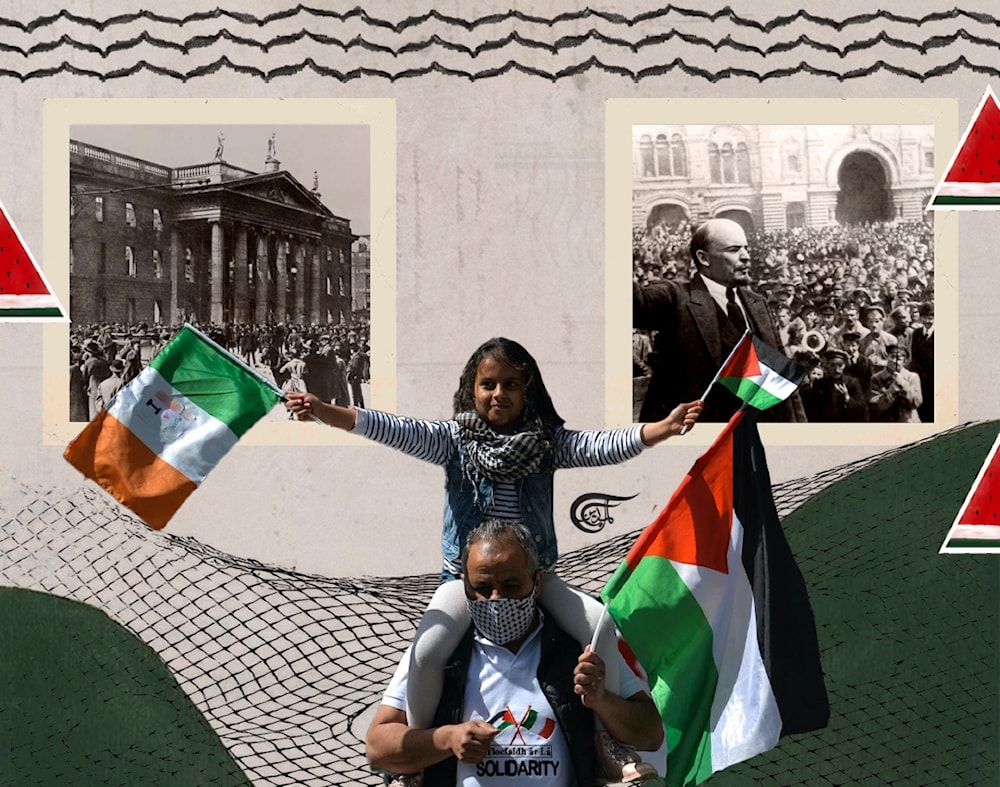Lenin, Ireland and Palestine
Rather than get distracted by Lenin's railing against European bourgeois nationalism (which was often parochial, chauvinistic, and at times imperial) we should look at his support for the 1916 Easter uprising in Ireland.
-

"If we lose Ireland, we have lost the Empire;" The same could be said about Palestine today, remembering that the Israeli colony was designed on the partition of Ireland. (Al Mayadeen English; Illustrated by Arwa Makki)
On the hundredth anniversary of the passing of Lenin, we should remember the passing of one of history’s few figures to not only overthrow an old order but to transform egalitarian ideals into a new society. It would be a mistake, if not a sin, to ignore the many practical lessons of his life.
However, it would be an even greater sin to read Lenin’s largely historical analysis as dogma or a blueprint from which to chart the future. He was a writer of his times.
Palestine, the great human and moral issue of our time, is a national question (a special case of Arab nationalism, as Ghada Hashem Talhami put it) but there is no doubt that Lenin would have supported the Palestinian struggle. All decent people do.
Rather than get distracted by Lenin's railing against European bourgeois nationalism (which was often parochial, chauvinistic, and at times imperial) we should look at his support for the 1916 Easter uprising in Ireland.
Irish nationalism, like that of most of the colonised world, was emancipatory. In the 1916 uprising, avowed socialists like James Connolly fought and died alongside romantic intellectuals like Pádraic Pearse. The 1916 uprising failed but catalyzed, soon after, an imperfect liberation of the Irish nation.
Lenin noted this was a huge blow against the British Empire. Indeed the Chief of the Imperial General Staff, Sir Henry Wilson, said in March 1921, “If we lose Ireland we have lost the Empire.”
We could say much the same about Palestine today, remembering that the Israeli colony was designed on the partition of Ireland. The 1917 Balfour Declaration’s purpose was to form a “little loyal Jewish Ulster in a sea of potentially hostile Arabism”, according to Ronald Storrs, the military governor of Palestine.
If Anglo-America loses its Israeli colony in Palestine, it will have lost its key base in West Asia, undermining its imperial role in that region and beyond. An independent West Asia will facilitate Eurasian integration, Washington’s greatest fear.
We can draw on Lenin by warning of the dangers of comprador and bourgeois Arabs, set to betray the Palestinian struggle at the last moment, particularly over land and privileges for the colonists (as was done in Zimbabwe and South Africa) but the liberation of Palestine, the democratising of the historic lands, holds enormous promise for the many millions of ordinary people who have struggled and sacrificed.
The dismantling of Apartheid "Israel" and the creation of a single democratic state in historic Palestine (with appropriate land and refugee justice) will firstly liberate the Palestinian people from the criminal oppression of a genocidal regime, and it will also remove the yoke of Anglo American imperialism from that region and from much of the world.
After that, a class struggle will likely continue.
References:
Cronin, David, (2017), Balfour’s Shadow.
Hashem Talhami, Ghada (2001), Syria and The Palestinians: The Clash of Nationalisms.
Lenin V.I. (1903-1922), Lenin on the National Question, essays.
Lenin V.I. (1916), Lenin on 1916 (Ireland).

 Tim Anderson
Tim Anderson
 3 Min Read
3 Min Read









